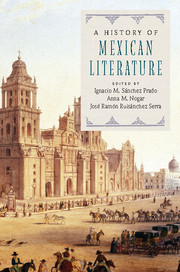Book contents
- Frontmatter
- Contents
- List of contributors
- Introduction
- PART I COLONIAL LITERATURE
- 1 The Languages and Literatures of Early Print Culture in the Colonia
- 2 A Chronicon of Crónicas: The New Spanish Prose Narrative
- 3 Theatricality and the Public Enactment of the Mexican Colonial
- 4 Sor Juana Inés de la Cruz: The Tenth Muse and the Difficult Freedom to Be
- 5 Jesuit Enlightenment: Interventions in Christianity and Intellectualism
- 6 Women in the Print Culture of New Spain
- 7 The Colonial Literary Scope: Empire, Letter, and Power
- 8 New Spain's Archival Past and Present Materiality
- PART II THE NINETEENTH CENTURY
- PART III TWENTIETH AND TWENTY-FIRST CENTURIES
- PART IV MEXICAN LITERATURE BEYOND BOUNDARIES
- Index
- References
5 - Jesuit Enlightenment: Interventions in Christianity and Intellectualism
from PART I - COLONIAL LITERATURE
Published online by Cambridge University Press: 05 July 2016
- Frontmatter
- Contents
- List of contributors
- Introduction
- PART I COLONIAL LITERATURE
- 1 The Languages and Literatures of Early Print Culture in the Colonia
- 2 A Chronicon of Crónicas: The New Spanish Prose Narrative
- 3 Theatricality and the Public Enactment of the Mexican Colonial
- 4 Sor Juana Inés de la Cruz: The Tenth Muse and the Difficult Freedom to Be
- 5 Jesuit Enlightenment: Interventions in Christianity and Intellectualism
- 6 Women in the Print Culture of New Spain
- 7 The Colonial Literary Scope: Empire, Letter, and Power
- 8 New Spain's Archival Past and Present Materiality
- PART II THE NINETEENTH CENTURY
- PART III TWENTIETH AND TWENTY-FIRST CENTURIES
- PART IV MEXICAN LITERATURE BEYOND BOUNDARIES
- Index
- References
Summary
An assessment of the Jesuits’ contributions to the enlightened culture of New Spain must refer back to Ignacio de Loyola and his Ejercicios espirituales (1541), the ur-figure and the ur-text of the society, because they both exemplify, in all of its contradictions, the order's greatest potential, as well as its limitations. On the one hand, Loyola's unwavering determination and originality – which initially caused him problems with the Inquisition – and the radical, transformative power of his Ejercicios represent a threshold in the religious and political life of sixteenth-century Spain and Europe: the opening of an opportunity for a reformed, modernized Catholicism to remake the world one person and one place at a time. The society's relatively late creation occurred at a moment of profound crisis and social changes – the Counterreformation, the conquest of the New World – which allowed it to engage such situations with a fresh outlook, without the encumbrances of the by then perhaps stale traditions of other religious orders. On the other hand, the Jesuits’ flexibility and openness to tackling mundane affairs that would allow them to influence what was happening in the world had a limit in the image of the king who leads his armies against the infidels. Loyola conjures up this idea in the Ejercicios to cast away any doubts as to what one should do in order to serve God – the Jesuit leader's stated goal (Loyola, 1944: 54–55). Nevertheless, for some time the Jesuits were able to maneuver the space between Loyola's autonomy and his own invocation of power without exacerbating the rift between the friars’ service to God and their commitment to serving him in the world. The following pages will address the Jesuits’ strong contribution to the Enlightenment in eighteenth-century New Spain, in the context of the transformation of this order that had been torn between independence and acquiescence since its inception.
The Jesuits’ unparalleled vitality allowed them to expand rapidly throughout the globe and to create one of the most impressive networks of communication and knowledge exchange in the early modern period, along with what continues to be the most expansive educational system the world has ever known.
- Type
- Chapter
- Information
- A History of Mexican Literature , pp. 81 - 96Publisher: Cambridge University PressPrint publication year: 2016



